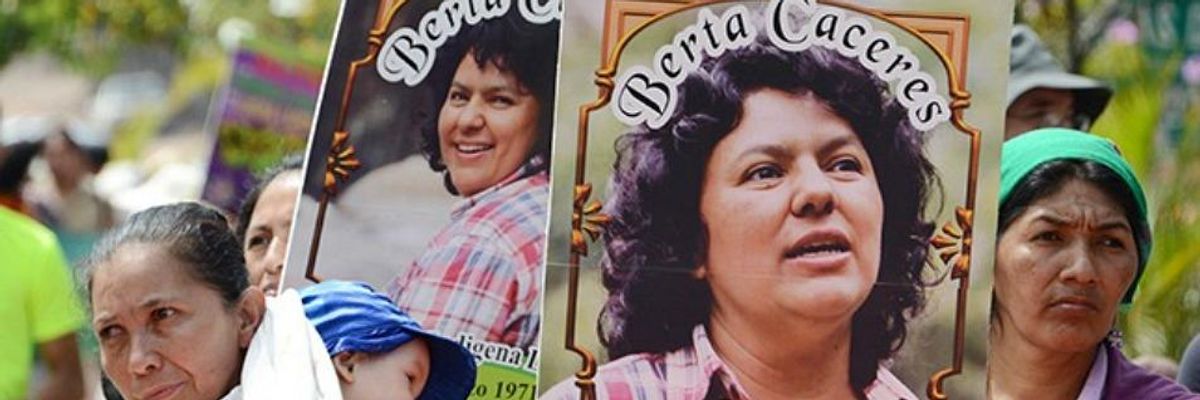It appears the United States government is not the only one in the world with a 'kill list.'
According to new reporting by the Guardian published Tuesday, U.S.-trained special forces units within the Honduras military are operating an assassination program--complete with a hitlist comprised of names and photos--that targets social justice and environmental activists with "elimination."
"Human rights violations are state policy in Honduras."--Berta Zuniga Caceres,
daughter of slain activist Berta CaceresBased on testimony from a whistleblower and former soldier who refused to follow orders to target those on the list, fled the country, and now fears for his life, the newspaper reports that the list is distributed to two elite units along with orders to systematically assassinate each person on it.
The whistleblower, a 20-year old former First Sergeant from the Xatruch unit that operates on the Caribbean coast, asked to be referred to by the pseudonym Rodrigo Cruz for fear of reprisal.
"If I went home, they'd kill me. Ten of my former colleagues are missing," Cruz told the Guardian.
Prominent Indigenous land defender Berta Caceres was at the top of that list before her assassination in March, Cruz said.
Prior to her murder, Caceres herself said she believed such a hit list existed and that she was on in it. She blamed the U.S., specifically then-secretary of state Hillary Clinton, for turning a blind eye to the right-wing government that took over in a military coup in 2009 and the surge in human rights violations by security forces that followed.
"I'm 100 percent certain that Berta Caceres was killed by the army," Cruz told the Guardian.
The newspaper wrote:
According to Cruz, Caceres's name appeared on a list given to a military police unit in the Inter-institutional Security Force (Fusina), which last summer received training from 300 US marines and FBI agents.
Five men have been arrested for her murder, including Maj Mariano Diaz Chavez, an active-duty major in the Honduran army. Diaz had previously participated in joint US-Honduran military operations in Iraq, and is reported by local media to be a graduate of the elite Teson special operations course which is partly taught by US special forces. Diaz was a military police instructor when arrested, but has since been given a dishonourable discharge.
"Cruz's testimony suggests death squads are targeting political opposition, but the justice system is so broken, and directly controlled by figures implicated in corruption, that there is no one [in Honduras] who can credibly investigate," Annie Bird, director of the group Rights and Ecology which documents human rights abuses in Honduras, told the Guardian.
Cruz's statements strengthen the Caceres family's appeal for an independent international investigation into the Berta Caceres' death.
"This shows us that death squads are operating in the armed forces, which are being used to get rid of people opposing government plans," Caceres' daughter told the Guardian. "It shows us that human rights violations are state policy in Honduras."
The U.S. has given Honduras an estimated $200 million in military aid since 2010, the newspaper observed, and the aid continues unabated despite a recent State Department assessment that "among the most serious human rights problems" in the country are "unlawful and arbitrary killings by security forces."
"This is disturbing smoking-gun evidence which reinforces calls that the U.S. must withdraw military aid from Honduras where there's been a bloodbath since the 2009 coup," Lauren Carasik, director of the International Human Rights Clinic at Western New England University, told the newspaper.
Cruz also told the Guardian that the lieutenant in charge of his unit deserted after being ordered to carry out the kill list:
"The lieutenant said he wasn't willing to go through with the order as the targets were decent people, fighting for their communities. He said the order came from the joint chiefs of staff [and] he was under pressure from the Xatruch commander to comply," Cruz said.
A few days later, the lieutenant left the base and has not been seen since.
Indeed, the murders reflect a wider trend, as a recent report found state and private forces colluding to kill environmental and land defenders in shocking numbers around the globe--and particularly in Latin America.
Cruz saw the list twice, the Guardian noted--the first time was when sheets of paper had accidentally "fallen out of his commander's vest in the jeep which Cruz drove."
"There's been a systematic strategy to eliminate the most belligerent social leaders."
--Vitalino Alverez, United Peasant Movement (MUCA), survivor of four assassination attempts since 2010"I only had them in my hand for 20 or 30 seconds but I recognized some faces as leaders from the Bajo Aguan [region]. I didn't say anything," Cruz said.
The Guardian noted, "The Bajo Aguan region--where the Xatruch taskforce is based--has been the setting for a string of violent land disputes between powerful palm oil magnates and local farmers. More than 100 people--mainly peasant activists--have been killed, many at the hands of state or private security forces."
"Among the names on the hitlist seen by Cruz was that of Juan Galindo, an activist who had fled the region after receiving threats, but was murdered in November 2014 after returning home from exile to visit his sick mother," the newspaper noted. "Cruz also recognised Johnny Rivas and Vitalino Alvarez, high-profile members of the United Peasant Movement (MUCA). Both men were among 123 activists in the Bajo Aguan named by the Inter-American Commission on Human Rights (IACHR) in 2014 as requiring urgent protective measures."
Alvarez, 52, who has survived four assassination attempts since 2010, told the newspaper: "There's been a systematic strategy to eliminate the most belligerent social leaders. Since they killed Berta, the rumors are I'm now top of that list."

